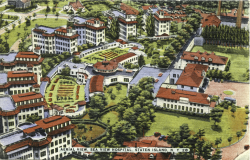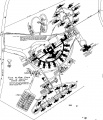Difference between revisions of "Seaview Hospital"
m (→Images) |
M-Explorer (talk | contribs) |
||
| Line 46: | Line 46: | ||
[[Category:Cottage Plan]] | [[Category:Cottage Plan]] | ||
[[Category:Active Institution]] | [[Category:Active Institution]] | ||
| + | [[Category:Past Featured Article Of The Week]] | ||
Revision as of 05:32, 4 June 2017
| Seaview Hospital | |
|---|---|
 | |
| Established | 1837 |
| Opened | 1913 (As a Sanatorium) |
| Current Status | Active |
| Building Style | Cottage Plan |
| Architect(s) | Raymond Almilrall |
| Location | Staten Island, NYC, NY |
| Alternate Names |
|
History
The Richmond County Poor Farm was established in the 1830's after the city acquired a 91 acre area called Stephen Marine farm. Over the next few years a cholera hospital and insane asylum were built along with housing for the poor. The residents worked on the farm in exchange for food and housing.
In 1902 the name of the farm was changed to the New York City Farm Colony. At this time the farm contained sixteen buildings, including dormitories, a dining and kitchen building, laundry and industrial building, shops, nurses residence and a morgue among others. The area also contained the Staten Island Potters Field and it was used as a cemetery until 1905.
Across the street from the Farm a 25 acre estate of Charles Schmidt known as Ocean View became the proposed location of a tuberculosis hospital in 1905. Seaview Hospital was opened on November 12, 1913 at this location.
The Farm merged with Seaview Hospital in 1915 and the entire area was renamed Seaview Farm, till 1921 when the merger ended. The Farm expanded throughout the 1930's and slowly became mostly an old age home. Seaview Hospital became the first tuberculosis hospital to have a maternity ward and led the country in the treatment and caring of TB patients. Research at the hospital would help end the tuberculosis epidemic.
In 1961 the Farm once again merged with Seaview Hospital, the hospital phasing out its tuberculosis wards and slowly becoming a geriatric hospital. Most of the TB facility built in the 1930s is still in use although the old farm colony and isolation ward buildings are abandoned or have been demolished.


